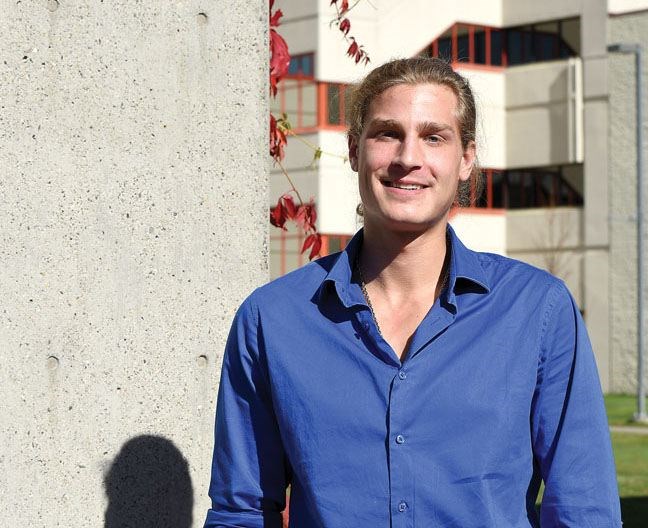Side-by-side, Andrew Stiller's hands flat on the table, two words form in years-old ink: late fate.
At 17, he had an ex-girlfriend tattoo the thin block letters just below his knuckles.
"Growing up as a kid I felt like my future was much brighter than just being a drug addict, but unfortunately for the foreseeable future that's all I could see," said Stiller, now 24, a psychology student at College of New Caledonia and clean for more than two years.
"I kind of had those as a reminder that one day I would have a better fate or destiny."
But at the time, Stiller was in the throes of his addiction. In Grade 9, he started "occupying his time" with other things: alcohol, drugs and eventually methamphetamine.
By Grade 11, he was a dropout. At 21, he was homeless. All his resources had run out, and still he spent his meagre funds on the next fix. No one would choose that life, he said.
"It's just a terrible terrible disease," said Stiller, sitting on a bench on CNC's front lawn, sun in the sky. "I think it's what every alcoholic and addict experiences, it's just like an eternal sense of hopelessness.
"You don't really realize how fast your life slips away. You focus on the next high and the next drink and then you almost wake up out of a fog," he said. "All those dreams that you have growing up as a kid, through addiction you just eventually accept that those dreams aren't really possible anymore."
That started to change when Stiller, after his stint on Victoria's streets, moved to Baldy Hughes, the Prince George-based treatment centre.
There Stiller met Peter Goudal, vice principal of the Centre for Learning Alternatives, and the man responsible for bringing a high school graduation program to the centre.
It launched in 2008, when Goudal was revising a similar program at the Prince George Regional Correctional Centre and found that a lot of the youth had addictions problems.
At Baldy Hughes, the statistics were similarly stark.
"It was around 60 per cent of the men residing at Baldy Hughes had not graduated (from high school)," Goudal said.
The men take three elective courses on the site: Planning 12, which also ties into their recovery plan; a PE credit using the centre's gym and recreation facilities; and a work experience portion.
Every Tuesday, Goudal is out there working with the men on English and math skills for the final two courses.
Goudal estimated Stiller is one of about 450 who have enrolled in the program over the past seven years. More than 60 have earned a Dogwood Diploma - a rate that Goudal considers a success.
"The harsh reality is, it is still dealing with a disease and not everybody makes it through that," said Goudal. "We just try to help and support and network the best.
"(Some students) have flourished and others are still struggling."
Stiller credits people like Goudal for his transformation.
"I'm just some regular meth head that got a lucky break, really. It was basically because of the people in my life and the positive supports in the community and people like Peter," Stiller said.
"Graduating for me was that first step of actually getting back to having goals and ambitions," he said. "Without graduation you can't go back to college, you can't advance yourself."
Even so, Stiller relapsed after leaving Baldy Hughes the first time. Then he was back six months later in March 2013 and stayed the full year. This time he was more receptive to the advice of counsellors.
"Taking advantage of the resources along with that mindset was for me what did it," said Stiller, who had enrolled in CNC by the end of the treatment program.
The support at Baldy Hughes is incredible, said Stiller; when counsellors found out he was pursuing psychology, they donated their old textbooks.
Both Stiller and Goudal speak highly of each other.
"Peter's phenomenal," Stiller said. "The things that Peter does for that place, you really get to see what people's hearts are made of."
Meanwhile, Goudal said he's passionate about removing barriers to education and making a difference with people who struggle.
"I think human beings are very resilient," said Goudal, who said some of the biggest barriers for addicts can be how society stereotypes them. "They're capable of achieving great things, once they get on a path, a direction."
For Stiller, that direction came with his Dogwood, giving him the opportunity to grasp again at the dreams of his childhood.
"For me, it made all the difference," Stiller said. "Coming back to school has been the best choice that I've made with my life other than getting clean."



.png;w=120;h=80;mode=crop)